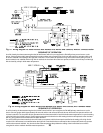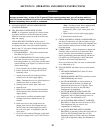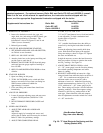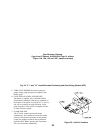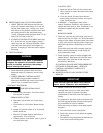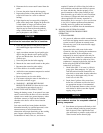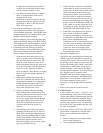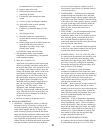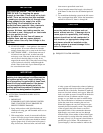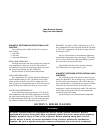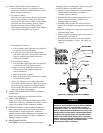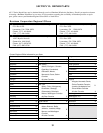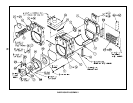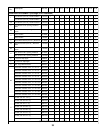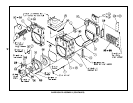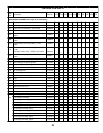
28
10. START-UP NOISE — Late ignition is the cause of
start-up noises. If it occurs recheck for electrode
settings, flame shape, air or water in the fuel lines.
11. SHUT DOWN NOISE — If the flame runs out of
air before it runs out of fuel, an after burn with
noise may occur. That may be the result of a faulty
cut-off valve in the fuel pump, or it may be air
trapped in the nozzle line. It may take several firing
cycles for that air to be fully vented through the
nozzle. Water in the fuel or poor flame shape can
also cause shut down noises.
IMPORTANT
CHECK TEST PROCEDURE. A very good test for
isolating fuel side problems is to disconnect the
fuel system and with a 24" length of tubing, fire
out of an auxiliary five gallon pail of clean, fresh,
warm #2 oil from another source. If the burner
runs successfully when drawing out of the
auxiliary pail then the problem is isolated to the
fuel or fuel lines being used on the jobsite.
P. ATTENTION TO BOILER WHILE NOT IN
OPERATION.
1. IMPORTANT
IF BOILER IS NOT USED DURING WINTER
TIME, IT MUST BE FULLY DRAINED TO
PREVENT FREEZE DAMAGE.
2. Spray inside surfaces with light lubricating or
crankcase oil using gun with extended stem so as to
reach all corners.
3. With steam boilers, at end of season add sufficient
water to fill boiler to top of water column and leave
it that way until fall when water should be drained
again to proper level. If at this time boiler water is
dirty, drain water, flush out boiler, and refill with
clean water to prescribed water level.
4. Always keep the manual fuel supply valve shut off
if the burner is shut down for an extended period of
time.
5. To recondition the heating system in the fall season
after a prolonged shut down, follow the instructions
outlined in Section IV, Items A through M.
CAUTION
This boiler contains controls which may
cause the boiler to shut down and not
restart without service. If damage due to
frozen pipes is a possibility, the heating
system should not be left unattended in
cold weather; or appropriate safeguards
and alarms should be installed on the
heating system to prevent damage if the
boiler is inoperative.
IMPORTANT
SUCTION LINE LEAKS - THE OIL MUST BE
FREE OF AIR. Try bleeding the pump
through a clear tube. There must be no froth
visible. There are various test kits available
to enable you to look at the oil through clear
tubing adapted to the supply line at the
pump fitting. Air eliminators are on the
market that have potential. Also, electronic
sight glasses are being used with good
success. At times, new tubing must be run
to the tank or new fittings put on. Just make
sure you get the air out.
Any air leaks in the fuel line will cause an
unstable flame and may cause delayed
ignition noises. Use only flare fittings in the
fuel lines.
A leaky system will increase the volume of make-up
water supplied to the boiler which can significantly
shorten the life of the boiler. Entrained in make-up
water are dissolved minerals and oxygen. When the
fresh, cool make-up water is heated in the boiler the
minerals fall out as sediment and the oxygen
escapes as a gas. Both can result in reduced boiler
life. The accumulation of sediment can eventually
isolate the water from contacting the cast iron.
When this happens the cast iron in that area gets
extremely hot and eventually cracks. The presence
of free oxygen in the boiler creates a corrosive
atmosphere which, if the concentration becomes
high enough, can corrode the cast iron through
from the inside. Since neither of these failure types
are the result of a casting defect the warranty does
not apply. Clearly it is in everyone’s best interest to
prevent this type of failure. The maintenance of
system integrity is the best method to achieve this.
Q. FREQUENT WATER ADDITION



